God's Politics
I had a chance to hear
Rev. Jim Wallis preach at
Ebenezer Baptist Church last night. His homily wasn't laden with concrete strategies and techniques for the Christian progressive. His vision, however, certainly shook me and pushed me farther forward into the social justice issues I've been wrestling with lately. The spirit of Martin Luther King, Jr. was called forward and I could feel the energy ripple through the assembly.
Jim Wallis is editor-in-chief of
Sojourners magazine and author of the
book God's Politics : Why the Right Gets It Wrong and the Left Doesn't Get It. He also alluded to an involvement in the
Civil Rights Movement as well as having preached in the old Ebenezer sanctuary in MLK's day. He is fundamentally a liberal with a strong focus on community action.
Wallis laid out his issue with mixing politics into religious discourse:
Since when did believing in God and having moral values make you pro-war, pro-rich, and pro-Republican? And since when did promoting and pursuing a progressive social agenda with a concern for economic security, health care, and educational opportunity mean you had to put faith in God aside?
What did the Right get wrong?
In a word, faith. He pointed out that it wasn't the Religious Right that grasped control of the Republican Party; it was the Republican Party that used the databases of churches and congregations to spread their ideology and
create the Religious Right. Even if it seems a little like the Chicken or Egg debate, Wallis has a strong point that the biblical basis for many issues on the Republican platform are very selective.
The major hot-button "moral value" issues were limited to abortion and same-sex marriage. The honest truth is both of these on their own are nothing. Without supporting the "society of life" fully by rejecting all forms of murder (including the death penalty) and increasing monetary and volunteer support for adoption programs, the abortion issue alone is useless. Without social context, the same applies to same-sex marriage.
Wallis continued to enumerate other important "moral values" that were lacking from the Religious Right agenda. Such as eliminating poverty, revamping education, environmental stewardship, global peace, and civil rights. These values are paid lip service, of course, but the Religious Right presents no viable strategy to tackle these things. When it came to the environment, Wallis clarified further: "You know, what is called God's Creation?"
He was careful to differentiate the average Republican from the current leadership of the Republican Party. The "white house theology" is no replacement for all peoples of faith, and no one should accept its superiority. He re-emphasized the fact that no matter whether you are a Republican or Democrat, God is not necessarily on your side. The fact that one party has control over God is ridiculous.
What doesn't the Left get?
In a word, faith. Left organizations have gone too far in banning religious expression from the public square, and have even tried to ignore religion from their politics. Wallis pointed out the fact that by doing so, the Left has allowed the Right to set the religious tone and claim the moral high ground. This despite all the Left owes to religion and the movements it supports.
One man from Massachusetts thought it would be easier to come out as a homosexual in the Democratic Party than as a Catholic. Wallis emphasized acceptance of atheists, agnostics, Jews, Muslims, Buddhists, and minority denominations, but not by ignoring their differences. Only by uniting on their moral similarities can the Left reject the Right's agenda.
Another important issue was raised. The Left needs not only to accept religious, but embrace it. Wallis pointed out that every big movement (abolition, suffrage, civil rights) in this country was based on religion. Faith provides the strength to change the world and a safety net during the inevitable pitfalls. Wallis needed no elaboration, recalling the power of prayer and song during the Civil Rights Movement.
I also recalled Martin Luther King, Jr.'s address in the March on Detriot:
For we’ve come to see the power of nonviolence. We’ve come to see that this method is not a weak method, for it’s the strong man who can stand up amid opposition, who can stand up amid violence being inflicted upon him and not retaliate with violence.
You see, this method has a way of disarming the opponent. It exposes his moral defenses. It weakens his morale, and at the same time it works on his conscience, and he just doesn’t know what to do. If he doesn’t beat you, wonderful. If he beats you, you develop the quiet courage of accepting blows without retaliating. If he doesn’t put you in jail, wonderful. Nobody with any sense likes to go to jail. But if he puts you in jail, you go in that jail and transform it from a dungeon of shame to a haven of freedom and human dignity.
And even if he tries to kill you, you’ll develop the inner conviction that there are some things so dear, some things so precious, some things so eternally true, that they are worth dying for.
These words speak to the growing Christian Progressive movement. Civil disobedience and nonviolence are our weapons against the "holier than thou" hypocrisy. Whether you are right-leaning, left-leaning or centrist, religious or non-religious, we as a people in this country, in this world, have an obligation to hold those in power accountable for their actions.
John 15-16 comes to mind:
"When the Counselor has come, whom I will send to you from the Father, the Spirit of truth, who proceeds from the Father, he will testify about me. You will also testify, because you have been with me from the beginning.
“These things have I spoken to you, so that you wouldn’t be caused to stumble. They will put you out of the synagogues. Yes, the time comes that whoever kills you will think that he offers service to God. They will do these things because they have not known the Father, nor me.
"When he has come, he will convict the world about sin, about righteousness, and about judgment; about sin, because they don’t believe in me; about righteousness, because I am going to my Father, and you won't see me any more; about judgment, because the prince of this world has been judged.
Once we cede to any group, no matter what their policies, moral superiority or higher ground, we give away our right to free thought. The more we are incited by the group, the more we should question the validity of those claims. If everyone has an angle, the most compelling and readily available evidence should never be taken on face value. The harsh reality is that evidence has been either skewed or completely manufactured.
With no questions to ask, there can be no answers. If any group claims to have all of life's answers figured out, they're a liar. The Left doesn't have all of those answers, nor does the Right. I have a lot more faith in myself figuring out my own purpose than a political group anyhow.
Heaven's Not Overflowing
I have to thank the band
COC for the title of this entry, because I can think of little else to say about the current Iraq Occupation. Our American troops, gumshoe Iraqi police and the few coalition allies
that haven't withdrawn are constantly attacking what is collectively known as the "insurgency". Rather than understand what has created and sustained this insurgency or appreciate its complexity, the US and fledgling Iraqi government are intent on cracking down on an unseen foe. This despite suggestions that these very maneuvers (especially in Fallujah and Baghdad) have encouraged insurgency recruitment efforts and systematic violence.
The Center for Strategic and International Studies puts it
this way:
The US assumed for the first year after the fall of Saddam Hussein that it was dealing with a limited number of insurgents that Coalition forces would defeat well before the election. It did not see the threat level that would emerge if it did not provide jobs or pensions for Iraqi career officers, or co-opt them into the nation building effort. It was slow to see that some form of transition payments were necessary for the young Iraqi soldiers that faced massive, nation-wide employment. As late as the spring of 2004, the US still failed to acknowledge the true scale of the insurgent threat and the extent to which popular resentment of Coalition forces would rise if it did not act immediately to rebuild a convincing mix of Iraqi military and security forces.
The US failed to establish the proper political conditions to reduce Iraqi popular resentment of the Coalition forces and create the political climate that would ease the task of replacing them with effective Iraqi forces. It did not make it clear that the US and Britain had no economic ambitions in Iraq and would not establish permanent bases, or keep Iraqi forces weak to ensure their control. It did not react to the immediate threat that crime and looting presented throughout Iraq almost immediately after the war, and which made personal security the number one concern of the Iraqi people. It acted as if it had years to rebuild Iraq using its own plans, rather than months to shape the climate in which Iraqis could do it.
Many embedded news sources including Knight Ridder have consistently documented the upswing in insurgent violence in Iraq. The unfavorable trends in the Iraq war might lead one to believe that the Coalition is losing or yielding hard-fought ground. The truth is much simpler: the Iraqi people and their government alone can win the minds of the people. While there is still a scapegoat in Iraq, one that is hardly blameless in reducing the average Iraqi standard of living, there will be no peace.
In January, Knight Ridder identified the following key points:
- The average number of U.S. soldiers wounded by hostile acts per month has spiraled from 142 to 808 during the same period. Iraqi civilians have suffered even more deaths and injuries, although reliable statistics aren't available.
- Attacks on the U.S.-led coalition since November 2003, when statistics were first available, have risen from 735 a month to 2,400 in October. Air Force Brig. Gen. Erv Lessel, the multinational forces' deputy operations director, told Knight Ridder on Friday that attacks were currently running at 75 a day, about 2,300 a month, well below a spike in November during the assault on Fallujah, but nearly as high as October's total.
- The average number of mass-casualty bombings has grown from zero in the first four months of the American occupation to an average of 13 per month.
- Electricity production has been below pre-war levels since October, largely because of sabotage by insurgents, with just 6.7 hours of power daily in Baghdad in early January, according to the State Department.
- Iraq is pumping about 500,000 barrels a day fewer than its pre-war peak of 2.5 million barrels per day as a result of attacks, according to the State Department.
Now, the US moves closer toward the Syrian border. Secretary Rice increases her rhetoric against supporting countries. Random raids and checkpoints increase across Iraq, most notably the increased Iraqi police presence in Baghdad. By doing so, the US has simultaneously
broken ties with Damascus and increased insurgent recruitment to unprecedented levels.
Will this be addressed? No. Because rather than attack the differing philosophies and various environs that sustain the insurgency, it is much easier to point to one key figurehead. And I guarantee you'll read many more blog entries that simply echo the headlines (
Abu Musab al-Zarqawi wounded or not?), rather than address the long term solvency of the Iraq occupation. It becomes the "head in the sand" argument. "We're already there and things are bad. If we left it would just get worse."
I don't claim to have all of the answers to this situation, but it seems to me that only a speedy withdrawal or concerted public relations effort can possibly mitigate the violence in Iraq. The crushing of the rebellion spells the beginning of a civil war and onset of a failed democracy. The impact of that failed democracy (so prevalent in US rhetoric) could spell disaster for the US Middle Eastern policy.
As former General Wesley Clark
put it back in November 2004:
[In Iraq,] there's no uniformed enemy force, no headquarters, no central command complex for the troops to occupy and win. At the end, there will be no surrender.
Instead, the outcome of the battle must be judged by a less clear-cut standard: not by the seizure and occupation of ground, but by the impact it has on the political and diplomatic process in Iraq. Its chances for success in that area are highly uncertain. Will Fallujah, like the famous Vietnam village, be the place we destroyed in order to save it? Will the bulk of the insurgents simply scatter to other Iraqi cities? Will we win a tactical victory only to fail in our strategic goal of convincing Iraqis that we are making their country safe for democracy?
To win means not just to occupy the city, but to do so in a way that knocks the local opponent permanently out of the fight, demoralizes broader resistance, and builds legitimacy for U.S. aims, methods and allies.
I really hope there is some way the US can regain some of its credibility in all of this chaos. But more than that, I hope all sides can negotiate some kind of cease-fire before Iraq becomes nothing more than a
no man's land.
How painful it is to admit that one country's future is trapped between many diverse competing interests, none of which are willing to relent. Caught in-between, I pray the common Iraqi will see things more clearly and take the harder road towards peace.
Before the line between civilian and insurgent can be understood by the police, it must be understood and embraced by the people. Without that differentiation, the war is already lost.
UPDATE 5/26/2005: More than 40,000 Iraqi soldiers are to be deployed in Baghdad in a massive operation to hunt down insurgents, the Iraqi defence minister has announced.
Human Rights '04
Amnesty International just published its
2005 Report, revisiting the state of human rights across the world during 2004. In it, Amnesty accused the US of many prisoner abuses and wartime criminal activity that not surprisingly, Bush and company denied as "ridiculous and unsupported by the facts." (
BBC) But to only address that part of the report is to deny its real message: we as citizens of the world still don't care, nor wish to understand our common humanity. Tragically, the good will of anti-terrorism and Asian Tsunami relief have faded back into the grinding wheels of corporation versus nation struggle.
In the
report's introduction, Amnesty clearly emphasizes the dual nature of global concern:
However, the reaction to the tsunami of the international community, including the response of ordinary people, was painfully at odds with the failure to deal effectively with other global crises which throughout 2004 left comparable numbers of victims in their wake. Economic interests, political hypocrisy and socially orchestrated discrimination continued to fan the flames of conflict around the world. The so-called "war on terror" appeared more effective in eroding the international framework of human rights principles than in countering the threat of international terrorism. The security of women facing gender-based violence in the home, in the community or in situations of conflict barely received attention. The economic, social and cultural rights of marginalized communities continued to be largely ignored.
Of course, Amnesty detailed the horrors in Darfur and the continued violence in the Sudan. Other examples included the Iraqi war, the sixth year of the Chechnyan war, the deteriorating situation in Haiti (despite attempts with UN/US intervention), the increased violence along the West Bank/Gaza Strip perpetuated by both Israeli forces and Palestinian extremists, and the civil war in the Ivory Coast. All in all, it is truly a deplorable record for civilized countries who claim their intervention seeks to eliminate or mitigate these tragedies.
Two major factors stand out in all of these conflicts. Namely, the proliferation of arms and external economic interests. What might surprise some is the role of corporate interests which supersede national ones:
The role of external players in prolonging conflict can be seen starkly in the Democratic Republic of the Congo (DRC), where more than three million civilians have been killed or have died from hunger and disease since August 1998. This conflict has been characterized by illegal killings, torture and rape by forces on all sides, and by the intervention of other states and international corporations in pursuit of their own interests, regardless of the human costs. Many countries have continued to supply arms to the DRC, often arranged and delivered by international arms brokering networks using circuitous routes to breach the UN arms embargo on the DRC.
In 2004, almost all of eastern DRC, where numerous armed groups are fighting for control of the land and its resources, remained under the de facto control of different armed groups or militia. Unlawful killings and torture persisted. Men, women and children were attacked with machetes, homemade weapons and small arms. Sexual violence was used as a weapon of war. There was extensive looting and destruction of homes, fields, schools, medical and nutritional centres, and religious institutions. All armed forces used children as soldiers.
After addressing the deplorable state of US detainees in both Gitmo and Abu Ghraib, the report emphasized violations in Iraq as part of its occupation:
Throughout 2004, violence was endemic in Iraq, whether in the form of unlawful killings, torture and other violations by US-led Coalition troops and Iraqi security forces, or attacks against civilians and others by armed groups. Delivery of aid and reconstruction assistance was debilitated by the violence. Millions suffered the consequences of destroyed infrastructure, mass unemployment and uncertainty about their future. Dozens of hostages were brutally killed, some beheaded on film that subsequently received worldwide media attention. Criminal gangs kidnapped scores of Iraqis, especially children, for ransom. And there was little or no progress in bringing to justice those responsible for past and present human rights abuses.
Meanwhile, the main human rights body of the UN ignored the crisis in Iraq. In April, the UN Commission on Human Rights decided to discontinue its review of the situation in Iraq at a time when monitoring, assistance and cooperation were of crucial importance to a successful transition from a brutal dictatorship to a government respectful of human rights. By doing so, the Commission showed yet again it had no stomach for confronting grave abuses of human rights in the face of intransigent governments.
Economic and social insecurity are obviously the root cause of these catastrophes, but with the growing power of multinational conglomerates on the world stage, what power can one person possibly wield? Even large national interests are becoming increasingly the consensus of corporate desires. Large militaries in the name of anti-terrorism torture and kill those who stand in the way of cheaper resources. There is no chain large enough or person important enough to block the bulldozers of unmitigated capitalistic greed.
In a phrase, it is "political consumerism". We as consumers feed the machine. Stop feeding it. The first step is in educating yourself about what you buy. No longer can blind capitalism perpetuate the violence. No longer can greed alone justify our need to buy. Based upon what you consume and don't, you become either another cog in the corporate apparatus or the wrench that strips its wheels.
Not sure where to start? Stop
shopping at Wal-Mart first. Then, start
buying blue. When it comes to coffee and chocolate, make sure it is
fair-traded.
Remember, you are the consumer and you vote with your money. Make your vote count!
Unshackle Science
After South Korean's momentous
announcement last week, British scientists were able to repeat the embryonic cloning process as well. With the possibility of patient-grafted organ transplants and tailor-made research subjects, the potential of this method is staggering. More unbelievable is its simplicity.
First, take one egg and remove its nucleus (DNA container). Next, extract the DNA from the patient through a non-obtrusive skin cell sample. Finally, place the DNA into the egg and you get embryo cells.
Let me emphasize something here for the genetic novices out there: the results are embryonic
cells, not a human being. Cells within a human being are constantly created and destroyed in your body everyday. Every time you exercise, older cells lose oxygen and new cells become oxygen-rich. Every time you bathe skin cells close to the epidermal surface are scraped off and discarded. Every time you take a blood test, countless blood cells perish in a tube.
Let's try using a building analogy. A cell is a stone brick. An embryonic cell is cement. Unlike the brick, embryonic cells can solidify into a variety of building pieces, forming the basis for arches, pillars, beams and of course, bricks. From a mason's viewpoint, the cement is much more flexible than a single brick, being able to fill cracks and outright replace other building structures. The time-consuming part is in mixing the cement and getting just the right consistency of water and stone. Once it is mixed properly, it can be further shaped into whatever is needed.
We'll come back to that. Currently, the House is considering two measures directly affected by the South Korean and British research: 1) lifting the 2001 ban on federal funded embryonic cell research (
HR 810) and 2) maintaining discarded human cord blood stem cells (
HR 2520). Both of these measures affect the collection and use of embryonic cells and the federal funding therein.
Tom Delay, not exactly the House Ethics Committee's
poster-child of morality, had this blurb in the
Associated Press:
DeLay, a Texas Republican, called the debate "a necessary and important step in our national conversation about the kind of people we will be, in a world of ever more promising and ever more unnerving medical technology." He equated reducing the funding restrictions imposed by Bush to a "vote to fund with taxpayer dollars the dismemberment of living, distinct human beings for the purposes of medical experimentation."
Dismemberment of human beings? If we are to claim these embryonic cells are to be called a human being, then I dare ask where is the Republican legislation to protect skin cells or blood cells, both of which we callously flake off or throw away?
Tom Delay is not the most intelligible opponent of this legislation, but his faulty reasoning is present in many others who truly believe embryonic cell research "destroys life to save other life". There is truly a well-exploited misconception that a group of cells that might form a human being equates to said human being.
Remember, a brick does not a building make, not even a pile of bricks. It is true that a cell is a life, but we destroy many cells every day and our body makes
new ones. I don't presume to know when simple cell life ends and a human being's life begins, but I do know a cell is not a human. It is only one piece to a much larger puzzle.
This debate avoids the crux of the issue: cloning of adults. This is the reason why the federal government should lead the way into ethical embryonic cloning, not outlaw it and have it imported from other countries.
I know the Republicans have many friends in the drug industry that would like diabetes, Parkinson's, Alzheimer's, arthritis, and other diseases to stay uncured to maximize their own patents and profits. But I think most Americans disagree. I know I do.
Let your congressional representative know what you feel and
drop them a line.
UPDATE: Today the first bill passed 238 to 194, with the president's ominous words: "This bill would take us across a critical ethical line by creating new incentives for the ongoing destruction of emerging human life. Crossing this line would be a great mistake."
Email the president and urge him not to veto this legislation!
Americanism without Jingoism
The
entire Tom Paine article that Bill Moyers wrote is quite long, but well worth the read for anyone concerned about the deplorable state of today's media apparatus. I don't know Mr. Moyers that well, only from his
PBS show NOW. Though from what I read in his article, all of his remarks seem quite on the mark. Moyers' view of patriotism and the flag especially struck me as something I would say if I had better eloquence:
“I wore my flag tonight. First time. Until now I haven't thought it necessary to display a little metallic icon of patriotism for everyone to see. It was enough to vote, pay my taxes, perform my civic duties, speak my mind, and do my best to raise our kids to be good Americans.
Sometimes I would offer a small prayer of gratitude that I had been born in a country whose institutions sustained me, whose armed forces protected me, and whose ideals inspired me; I offered my heart's affections in return. It no more occurred to me to flaunt the flag on my chest than it did to pin my mother's picture on my lapel to prove her son's love. Mother knew where I stood; so does my country. I even tuck a valentine in my tax returns on April 15.
So what's this doing here? Well, I put it on to take it back. The flag's been hijacked and turned into a logo — the trademark of a monopoly on patriotism. On those Sunday morning talk shows, official chests appear adorned with the flag as if it is the good housekeeping seal of approval. During the State of the Union, did you notice Bush and Cheney wearing the flag? How come? No administration's patriotism is ever in doubt, only its policies. And the flag bestows no immunity from error. When I see flags sprouting on official lapels, I think of the time in China when I saw Mao's little red book on every official's desk, omnipresent and unread.
But more galling than anything are all those moralistic ideologues in Washington sporting the flag in their lapels while writing books and running Web sites and publishing magazines attacking dissenters as un-American. They are people whose ardor for war grows disproportionately to their distance from the fighting. They're in the same league as those swarms of corporate lobbyists wearing flags and prowling Capitol Hill for tax breaks even as they call for more spending on war.
So I put this on as a modest riposte to men with flags in their lapels who shoot missiles from the safety of Washington think tanks, or argue that sacrifice is good as long as they don't have to make it, or approve of bribing governments to join the coalition of the willing (after they first stash the cash.) I put it on to remind myself that not every patriot thinks we should do to the people of Baghdad what Bin Laden did to us. The flag belongs to the country, not to the government. And it reminds me that it's not un-American to think that war — except in self-defense — is a failure of moral imagination, political nerve, and diplomacy. Come to think of it, standing up to your government can mean standing up for your country.”
Here are some of the arguments I generated on
LiveJournal after posting an abridged version of Moyers'
full article.
Until my next post, wear that flag with pride
... next to the "Pro-Soldier, Anti-War" button, of course.
Bloody Friday
Few people may have heard of
Uzbekistan until last week, when violent riots errupted in
Andijan , leaving many unnumbered citizens dead. The government claims these individuals were "Islamic terrorists", not civilians, while the international press claims the opposite.
To understand the complexity of this issue, the "democracy" of Uzbekistan needs to be understood.
Like so many other Soviet satellites, Uzbekistan declared independence in 1991 with the immediate goal of setting up a constitution with a separation of powers not unlike the US Constitution. In practice however, the executive branch filters the "free press", controls the judicary and limits the legislature session to only a few days a year, giving it barely a chance to meet publicly, much less pass laws. In 1995, one of those laws allowed for a referendem vote (without opposition) on sitting presidencies, rather than going through the extended democratic election process.
Thus,
Islam Karimov has been serving in the role of president for almost 15 years now, allowing a bicameral parliament but restricting opposition parties from registering in "elections". All provincial governers are selected and replaced by president Karimov without any vote or referendum and in 2001,
parliament endorsed a proposal to make Islam Karimov "president for life". Effectively, Karimov is the new Uzbek dictator, using the goodwill of 9/11 to prop his regime up under international scrutiny. Uzbekistan currently imprisions almost 6,000 "suspected extremists" which by law, have no legal recourse short of confession.
Amnesty International issued
this statement in July of 2004:
Thousands of people have been detained and imprisoned in Uzbekistan on accusations of "religious extremism". Among them are members and presumed members of independent Islamic congregations, members of banned Islamist and secular opposition parties and movements, and their relatives. Amnesty International has received persistent allegations that police have tortured many of those arrested to extract 'confessions'. Heavy sentences, including death sentences, have been imposed after trials which appear to have been grossly unfair.
How does this tyranny survive
despite the claim "democracy and freedom are on the march"? BBC News hits the nail on the head with
its report on Uzbekistan:
President Karimov has been able to pin the unrest on Islamic extremists, of which there are some active in Uzbekistan. This has allowed him to cow the rest of the population by making them afraid of religious extremism.
It has also enabled him to attract support from both Russia and China, who face their own Muslim fundamentalists. He has also had support from the West, especially the United States, which has an airbase near the Afghan border.
The West has known perfectly well what has been going on in Uzbekistan in recent years. But the West has trodden carefully, given Uzbekistan's role in supporting the war in Afghanistan and the country's resources of natural gas.
After the recent killings in Andijan, international scrutiny is finally putting pressure on Karimov and his despotism.
BBC News details the step by step slide from peace into violence:
May 12th People have been protesting peacefully outside a city court for four months over the trial of 23 local businessmen accused of Islamic extremism. All outside accounts describe the protestors as "quiet, orderly and very well organised." Then, late in the evening some protestors are arrested and taken away.
May 13th Gunmen storm the jail in the early hours and free the 23 accused men, their supporters and scores of other inmates. A small number of people are reported killed during the violence. By early morning, several thousand people are gathered in the town's main square.
Roads to the city centre are blocked and protesters control the area, including government offices. No security forces are in evidence, but government troops and tanks are said to be concentrated at the town's airport.
The crowd on Andijan's main square in front of the provincial administration building swells to about 10,000, the Ferghana.ru news agency's correspondent reports at 1446 (0946 GMT), and speakers use a "free" microphone to vent anger at economic problems. Some chant slogans against President Islam Karimov and the Uzbek government.
The initial assault by security forces begins with a convoy of armoured vehicles opening fire on the crowd. Many people flee. A large number of protesters - including gunmen and 10 police officers who have been held hostage - moves from the city centre towards School No 15, just over 1km away, unnamed witnesses tell Reuters news agency.
An armoured car fires into the crowd outside the school. Armed soldiers stand guard at the school, but people are being allowed in to identify relatives.
Reports later emerge that injured people were summarily executed, and that many bodies, especially of women and children, were taken away and concealed by the authorities, says Galima Bukharbaeva. There is evidence to suggest government security forces carried out further killings once the mass shooting was over. Once the crowd had dispersed, eyewitnesses say the security forces went around finishing off the injured as they lay on the ground.
May 14th On Saturday morning, the authorities cart off most of the bodies using three
trucks and a bus, according to witnesses.
A secondary school, a technical college and local parks are turned into impromptu morgues. Hundreds of Andijan residents search for missing relatives - on Babur Square itself and later at the collection points.
President Karimov appears at a press conference in Tashkent. He blames the violence on Islamic extremists who he says used women, old men and children as a "human shield". He puts the death toll at 10 soldiers and "many others".
The 50-year-old father of one missing man says: "Karimov's people shot women and children. I saw young men with their hands up, shouting 'Don't shoot'. But they just shot them."
This just sickens me. No government that does this to its own people can be or should be trusted. Before this democratic domino can fall, regime change is in order. I only hope the US and other nations that value human decency will see through Karimov's ploy and treat him for what he is: a criminal of the worst kind.
Email your senators to demand a foreign policy that deals with the reality.
Donate to Amnesty International to help bring Karimov to justice. Help the Uzbek refugees that have fled into Kyrgyzstan by giving to
Refugees International. We need to get our US government and the international community at large to match their actions to their rhetoric!
Revenge of the Bush
Yesterday George Lucas dropped
some bombshells on his conservative Star Wars fans at the Cannes Film Festival
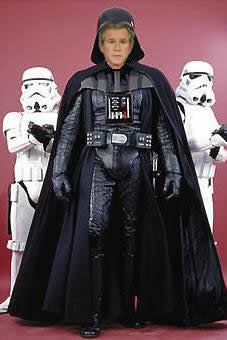
:
"In terms of evil, one of the original concepts was how does a democracy turn itself into a dictatorship,'' Lucas told a news conference at Cannes, where his final episode had its world premiere.
"The parallels between what we did in Vietnam and what we're doing in Iraq now are unbelievable.
"On the personal level it was how does a good person turn into a bad person, and part of the observation of that is that most bad people think they are good people, they are doing it for the right reasons,'' he added.
So much for the conservative notion that the
Empire represented the Soviet Union.
Here Lucas readily admits the presumed leftwing slant that most of Hollywood is accused. He acknowledged an uncomfortable feeling that the United States was in danger of losing its democratic ideals, like in the movie. "I didn't think it was going to get this close. I hope this doesn't come true in our country."
Lucas goes on to compare Bush to Anakin Skywalker/Darth Vader, supposedly having Anakin echo the
Bush Doctrine, "You are either with me or you are my enemy."
Personally, I always thought the Empire represented the
Weimar Republic before World War II and the chancellor turned emperor represented Adolph Hitler, but I stand corrected. Regardless, I can't help but take a guilty pleasure in watching devoted Bush/Star Wars fans squirm at the obvious implications.
I just might have to see Episode III in the theaters. That might make the whole cramped theater scene worth enduring...
UPDATE 5/19/2005:MoveOn.org has now jumped into the act, handing out flyers at theaters comparing the nuclear option and Senator Frist to the Dark Side. It's definitely over the top, but maybe this kind of sensationalism is what is needed to wake up the lethargic masses. What do you think?
The Article Heard 'Round the World
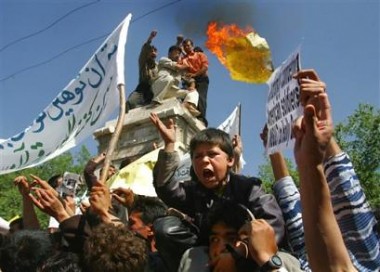
This story is totally unbelievable.
After reading the Newsweek article in question, I had a hard enough time believing that a security guard actually flushed a Koran down the toilet in front of a detainee. The physics of the thing (that's a powerful toilet!) as well as the ridiculousness of that yielding any good information ("If you don't tell me what I want, you're next!") defied belief.
Then, the MSM alerts me to the power of that one Newsweek article to spark riots in Afghanistan. Now, Newsweek claims the article was incorrect and apologizes for publishing it (claiming their anonymous informant changed his story) according to the
Associated Press:
In an apology to readers this week, Newsweek acknowledged errors in a story alleging U.S. interrogators at Guantanamo Bay desecrated the Quran. The accusations, which the magazine vowed to re-examine, spawned protests in Afghanistan that left 15 dead and scores injured.
Responding to harsh criticism from Muslim leaders worldwide, the Pentagon promised to investigate the charges and pinned the deadly clashes on Newsweek for what it described as "irresponsible" reporting.
"We regret that we got any part of our story wrong, and extend our sympathies to victims of the violence and to the U.S. soldiers caught in its midst," Editor Mark Whitaker wrote in the apology.
Whose fantasy is this? Does the US government really believe for a moment that anti-US sentiment can spring up in the matter of less than a week because of one magazine's article? Or does the US believe that all detainee abuse scandals are baseless despite
the obvious witnesses to the contrary? Better yet, how many protesters actually read the Newsweek article?
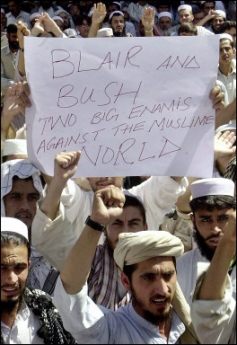
Is it possible that they
hated us before the Newsweek article, and this was just the spark that lit the powder keg? Could all of those
civilian targets bombed upset them so much? Could it have been the years of US
subversion during the Cold War and implicit support of Bin Laden? Could it be the fact we are
losing the public relations war so handily?
It is hardly likely it's
current administration policy that's causing all of the fuss, right?
And people wonder how the intelligence community could have gotten such faulty intelligence with this administration in office.
Poor analysis is obviously the answer. But the Afghani people could have told you that.
Update 5/17/2005: The lunacy continues with Deborah Pryce (R - OH) issuing the
following statement about Newsweek (nevermind the fact that the conservative magazine cleared the article with the Pentagon before publishing it):
"From the NY Times to CBS and now Newsweek, we've seen sensationalism trump truth in the haste to snag a headline and sell more papers, but this time the cost of ignoring journalistic standards has gone too far: seventeen people are dead and multinational relationships that have taken years to foster are jeopardized."
"Newsweek has apologized and retracted the story, but retraction and regrets will not atone for the reckless behavior of an irresponsible reporter and an overzealous publication. How many more lives have to be sacrificed until credibility can be returned to our newsrooms?"
"I urge the magazine and members of the media to return to the journalistic integrity that the public deserves, and I encourage every Congressional office to cancel their subscription to Newsweek until accountability is restored."
Will this insanity ever end? I guess it's easier to face one minor issue rather than decades of neglect and imperialism. Poor Newsweek...whipping boy for America's failed policies over the last fifty years.
Updated 5/26/2005: I guess the Newsweek article really was
off-base?
The US military says it has identified five incidents in which the Koran was mishandled by American personnel at the Guantanamo Bay prison camp.
Darfur Letter
I thought it was about time I emailed my senators about Sudan and the horrors going on there. Now, remember I'm from a red state, so both of my senators are Republicans. I had to throw in some of the "wave the flag" speech to motivate them.
Feel free to copy and paste this into one of
your own letters to your senators.
Dear Senator:
SUBJECT: DARFUR ACCOUNTABILITY ACT OF 2005 (S. 495)
I urge your passing of the Darfur Accountability Act of 2005 (S. 495, http://thomas.loc.gov/cgi-bin/query/z?c109:S.495.IS:) before the end of your legislative year. This act represents an acknowledgment of the horrors in Darfur and willingness to hold the North Sudanese government to account for their atrocities.
I cannot emphasize enough how important it is that we as Americans stand proud against tyranny and injustice wherever it is in the world. There is no injustice greater than genocide. Genocide systematically annihilates a select group of people and reduces through its policies, the dignity of life for all people. As the Darfur Accountability Act of 2005 clearly states, "the atrocities
unfolding in Darfur, Sudan, have been and continue to be genocide."
US academic Eric Reeves estimates the Darfur death toll at 340,000 while the UN refuses to count all of the deaths with their 70,000 estimate. From the BBC reports I read, the Darfur genocide still runs unabated with the Khartoum government providing little help for relief organizations including UN agencies. Despite the government's claim to the contrary, Janjaweed marauders are still armed and decimating villages, even though Khartoum has ceased its barbaric civilian air-raids.
But the question still remains: Can the Khartoum government be trusted after destroying its own people? How long can a cease-fire last when the government despises its own citizens?
There is no doubt in my mind that the members of the Khartoum government must be held to account for their crimes against humanity. I hope the Darfur Accountability Act of 2005 is one small step in that direction. I do not understand why our government is dragging its feet after the unheeded warnings of Rwanda and Bosnia. If there ever was a loud call for regime change, this would be it. The current cease-fire between the North and South Sudan, though important, is moving the focus from genocidal accountability to stabilizing the existing criminal government.
I expect you to support the Darfur Accountability Act of 2005 as both a patriot of the United State and a citizen of the world. Genocide should never be tolerated from a nation founded in its opposition to oppression. This is the moral course of action that faces US Foreign Policy toward Sudan. I only hope we will not be too late, with the memory of the Rwanda horrors still fresh on the global conscience. Again, thank you for your support on this.
What Wall?
On May 9, 2005, part of the VE-Day festivities involved a huge military parade in Red Square. As leader of the "Free World", President Bush of course attended. He was more than jovial with the President Putin, joking around with him and even offering to take a private drive with him in his Russian car.
Am I the only one who has a problem with this? Not only was the parade a tasteless display of militarism and jingoism, it glossed over the millions imprisoned and killed because of Stalinism. Meanwhile, there is Bush cutting up with Putin next to Lenin's tomb. I am not so much upset with Bush as I am the ridiculous world politic as of late. Are we only to remember the fall of Nazi Germany and not the oppression of Stalinism? Are we to forget Putin himself is guilty of a backward-sliding democratic vision? Where is history with its true face?
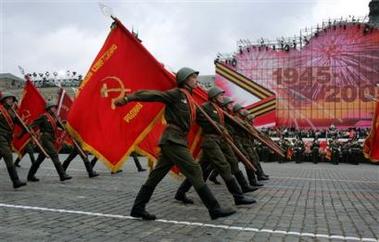
It seems commonplace now to bury history in a glory of fanfare rather than face its consequences. The consequences of Germany's defeat to Russia lead to the Berlin Wall and the insane MAD policies of the Cold War. At least somebody
said something about it:
The European Union said on Friday the fall of the Berlin Wall, rather
than Nazi Germany, was the "end of dictatorship" in Europe, risking upsetting
Russia as it prepares to celebrate World War II victory.
"We honor the many innocent victims of past conflicts and those who
paid the highest price in defense of freedom and democracy," the EU's executive
Commission said in a declaration marking the 60th anniversary of the end of the
war in Europe.
"We remember as well the many millions for whom the end of the Second
World War was not the end of dictatorship, and for whom true freedom was only to
come with the fall of the Berlin Wall."
Why is oppression so easily forgotten? ?
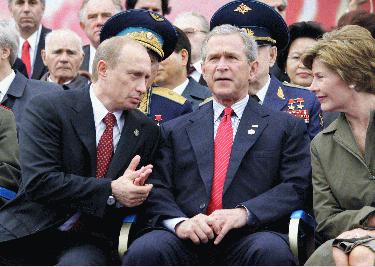
Just another case of political expediency winning over moral accuracy . . .
Feels like Deja Vu all over again.
Soldier for Peace
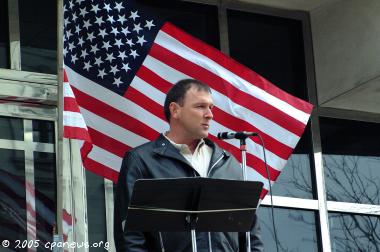
After hearing this brave soldier speak at GA Tech this weekend, I renewed my committment to pacificism. It is very easy for all of us to claim that war is a fact of life and no amount of effort can resolve these conflicts in any other way. But it takes true courage to challenge a longstanding military heritage in a time of war, and simply say, "No, I don't believe it." Some pacificists might find it hard to support a former soldier, but from his place, he may have a profound influence on those who would otherwise dismiss this immoral war. May we all have this courage in supporting Sgt. Benderman as he has shown to us.
Donate at
http://www.bendermandefense.org/.
UPDATE 5/12/2005: The new proposed budget has military spending 9:1 to other non-discretionary spending. Check it out at Tom Paine.
UPDATE 5/13/2005: Army Adds New Charges Against Kevin After Military Judge Finds Investigator Bias and Orders New Investigation, Postponing Court-Martial Proceedings. More here.
A Matter of Conscience
By Sgt. Kevin Benderman
HINESVILLE, GEORGIA, January 18, 2005-- Having watched and observed life from the standpoint of a soldier for 10 years of my life, I always felt there was no higher honor than to serve my country and defend the values that established this country. My family has a history of serving this country dating back to the American Revolution, and I felt that to continue on in that tradition was the honorable thing to do.
As I went through the process which led to my decision to refuse deployment to Iraq for the second time, I was torn between thoughts of abandoning the soldiers that I serve with, or following my conscience, which tells me: war is the ultimate in destruction and waste of humanity.Thoughts that we could, and should, consider better ways to solve our differences with other people in the world have crossed my mind on numerous occasions. And this was the driving force that made me refuse deployment to Iraq a second time. Some people may say I am doing so out of fear of combat; I am not going to tell you that the thought of going back to that place isn't scary, but that is not the reason for my decision to not return.
I want people to know that the longer I thought about just how stupid the concept of war really is, the stronger I felt about not participating in war. Why do we tell our children to not solve their differences with violence, then turn around and commit the ultimate in violence against people in another country who have nothing to do with the political attitudes of their leaders? Having read numerous books on the subject of war and having heard all the arguments for war, I have come to the conclusion that there are no valid arguments for the destructive force of war. People are destroyed, nations are destroyed, and yet we continue on with war. The young people that I went with to the combat zone looked at it like it was a video game they played back in their childhood.
When you contemplate the beauty of the world around us and the gifts we have been given, you have to ask yourself, "Is this what humanity is meant to do, wage war against one another?"
Why can't we teach our children not to hate or to not be afraid of someone else just because they are different from us? Why must it be considered honorable to train young men and women to look through the sights of a high-powered rifle and to kill another human being from 300 meters away? Consider, if you will, the positive things that could be accomplished without war in our lives: prescription medication that is affordable for seniors, college grants that are available for high school seniors – I could name a list of reasons not to waste our resources on war. The most important being to let the children of the world learn war no more. I've received e-mails from people who said that I was a coward for not going to war, but I say to them that I have already been, so I do not have anything to prove to anyone anymore. What is there to prove anyway – that I can kill someone I do not even know and who has never done anything to me? What is in that concept that anyone could consider honorable? I first realized that war was the wrong way to handle things in this or any other country when I went to the war zone and saw the damage that it causes. Why must we resort to violence when things do not go our way? Where is the logic of that? I have felt that there are better ways to handle our business than to bomb each other into oblivion.
When you are on the water in a boat and you have a chance to see dolphins playing with each other as they go about their business, you realize that if they can live without war, then humanity should be able to as well. Can't we teach our children to leave war behind in history where it belongs? We realized that slavery and human sacrifice were obsolete institutions, and we left them behind us. When are going to have the same enlightened attitude about war? I look at my stepchildren and realize that war has no place with me in giving them what they need to survive the trials and tribulations of early adulthood. And if you look at all the time soldiers lose in the course of fighting wars, such as birthdays and anniversaries, their children going to the senior prom and college graduations, and other things that can never be replaced, then you have to come to the understanding that war steals more from people than just the sense of humanity – it also steals some of that humanity from their family. I have learned from firsthand experience that war is the destroyer of everything that is good in the world; it turns our young into soulless killers, and we tell them that they are heroes when they master the "art" of killing. That is a very deranged mindset in my opinion. It destroys the environment, life, and the resources that could be used to create more life by advancing our endeavors.
War should be left behind us; we should evolve to a higher mindset even if it means going against what most people tell us in this country, such as that we can never stop fighting with other people in the world. I have made the decision to not participate in war any longer, and some people in this country cannot comprehend that concept, but to me it is simple. I have chosen not to take part in war, and it was easy to come to that decision. I cannot tell anyone else how to live his or her life, but I have determined how I want to live mine – by not participating in war any longer, as I feel that it is stupid and against everything that is good about our world.
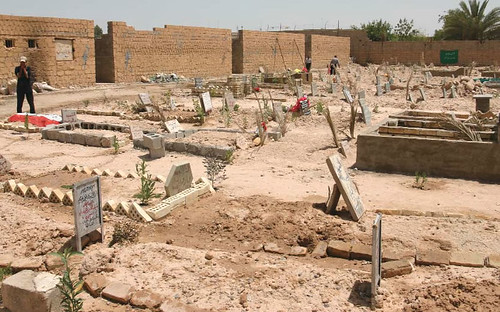



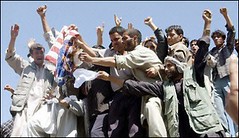

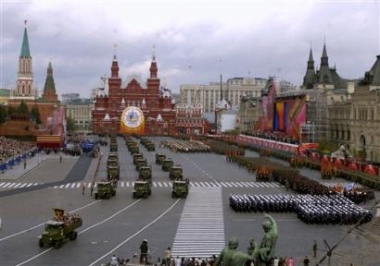


 After hearing this brave soldier speak at GA Tech this weekend, I renewed my committment to pacificism. It is very easy for all of us to claim that war is a fact of life and no amount of effort can resolve these conflicts in any other way. But it takes true courage to challenge a longstanding military heritage in a time of war, and simply say, "No, I don't believe it." Some pacificists might find it hard to support a former soldier, but from his place, he may have a profound influence on those who would otherwise dismiss this immoral war. May we all have this courage in supporting Sgt. Benderman as he has shown to us.
After hearing this brave soldier speak at GA Tech this weekend, I renewed my committment to pacificism. It is very easy for all of us to claim that war is a fact of life and no amount of effort can resolve these conflicts in any other way. But it takes true courage to challenge a longstanding military heritage in a time of war, and simply say, "No, I don't believe it." Some pacificists might find it hard to support a former soldier, but from his place, he may have a profound influence on those who would otherwise dismiss this immoral war. May we all have this courage in supporting Sgt. Benderman as he has shown to us.





